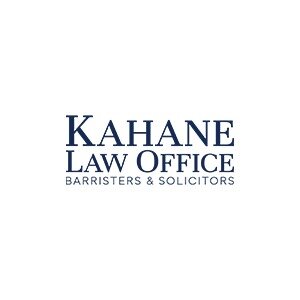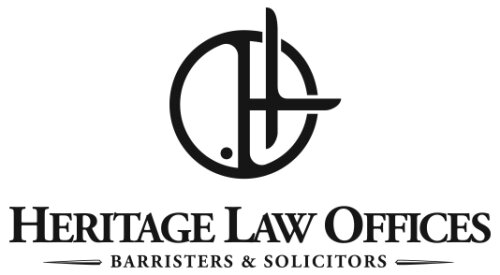Best Tax Increment Financing Lawyers in Edmonton
Share your needs with us, get contacted by law firms.
Free. Takes 2 min.
List of the best lawyers in Edmonton, Canada
About Tax Increment Financing Law in Edmonton, Canada
Tax Increment Financing (TIF) is an innovative public financing method used to stimulate economic growth and development in specific areas by using future tax revenues. In Edmonton, Canada, TIFs can be employed to support projects that aim to revitalize neighborhoods, build public infrastructure, and attract private investment. This financial mechanism helps leverage expected increases in property taxes resulting from redevelopment to finance current improvements. Edmonton has seen various TIF projects aimed at enhancing urban areas, making them more attractive for businesses and residents alike.
Why You May Need a Lawyer
Many complexities are involved in dealing with TIFs, which may necessitate legal assistance. Some common scenarios where you might need a lawyer include:
- Understanding the eligibility criteria and application process for a TIF project.
- Negotiating agreements between different stakeholders, such as municipal governments, private developers, and financial entities.
- Ensuring compliance with local laws and regulations related to TIF projects.
- Dispute resolution among parties involved in TIF agreements.
- Assistance with navigating the financial implications and potential risks of TIF projects.
Legal expertise can provide strategic advice, ensuring that your interests are protected throughout the TIF process.
Local Laws Overview
In Edmonton, the use of TIF is governed by local government policies and requires the coordination of various municipal departments. Some key aspects of local TIF laws include:
- The establishment of designated TIF districts where redevelopment projects are eligible for incentives.
- The requirement for detailed project proposals that outline the expected benefits and financial feasibility of projects.
- The need for public consultations and community engagement to ensure alignment with local development goals.
- Periodic assessment of the project's impact on property tax revenues and community development.
Understanding these regulations is critical for successful TIF project implementation in Edmonton.
Frequently Asked Questions
1. What is Tax Increment Financing?
Tax Increment Financing (TIF) is a financing tool used by municipalities to fund redevelopment projects by utilizing future increases in property taxes resulting from the improvements.
2. Who can apply for Tax Increment Financing?
Eligible applicants typically include private developers, non-profit organizations, and in some cases, public entities, seeking to undertake redevelopment projects within designated TIF districts.
3. How is a TIF district established in Edmonton?
A TIF district is established through a formal proposal and approval process, involving local government analysis of the area's redevelopment potential and public input.
4. What types of projects are typically supported by TIF?
TIF can support a variety of projects, including commercial real estate developments, infrastructure upgrades, and community revitalization initiatives.
5. How does TIF benefit local communities?
TIF aims to boost economic activity, enhance property values, and create job opportunities, leading to broader community improvement and a stronger local economy.
6. Are there risks associated with TIFs?
Yes, risks can include underperformance of the redevelopment project, leading to lower than expected tax revenues and financial strain on the project's overall viability.
7. How does public consultation work in the TIF process?
Public consultation involves stakeholder engagement and community meetings to collect feedback and ensure redevelopment projects align with local needs and priorities.
8. Can TIF funds be used for operational expenses?
No, TIF funds are typically restricted to capital improvements related to the designated project, not for covering operational costs.
9. How are TIF projects monitored in Edmonton?
TIF projects are subject to regular evaluations by local authorities to measure performance against expected outcomes and compliance with agreements.
10. What role do private investors play in TIF projects?
Private investors may finance part of the project cost, leveraging TIF incentives to make investment in redevelopment more attractive and feasible.
Additional Resources
For those seeking further information about TIF in Edmonton, the following resources can be beneficial:
- City of Edmonton Planning and Development office for guidance on specific local policies related to TIF.
- Alberta Municipal Affairs, which provides oversight and policy framework related to municipal financing initiatives.
- Local legal professionals and firms specializing in municipal and real estate law.
- Economic development organizations focusing on urban growth and revitalization initiatives.
Next Steps
If you require legal assistance with a TIF project, consider the following steps:
- Identify your specific needs and challenges related to TIF law.
- Contact a lawyer experienced in municipal finance and real estate in Edmonton.
- Gather all pertinent documents and information about your project for your initial consultation.
- Discuss your goals and concerns with your lawyer to develop a strategic approach.
- Stay informed about local developments and updates in TIF legislation that may affect your project.
Having expert legal counsel can significantly enhance the success of your TIF project and ensure compliance with Edmonton's local regulations.
Lawzana helps you find the best lawyers and law firms in Edmonton through a curated and pre-screened list of qualified legal professionals. Our platform offers rankings and detailed profiles of attorneys and law firms, allowing you to compare based on practice areas, including Tax Increment Financing, experience, and client feedback.
Each profile includes a description of the firm's areas of practice, client reviews, team members and partners, year of establishment, spoken languages, office locations, contact information, social media presence, and any published articles or resources. Most firms on our platform speak English and are experienced in both local and international legal matters.
Get a quote from top-rated law firms in Edmonton, Canada — quickly, securely, and without unnecessary hassle.
Disclaimer:
The information provided on this page is for general informational purposes only and does not constitute legal advice. While we strive to ensure the accuracy and relevance of the content, legal information may change over time, and interpretations of the law can vary. You should always consult with a qualified legal professional for advice specific to your situation.
We disclaim all liability for actions taken or not taken based on the content of this page. If you believe any information is incorrect or outdated, please contact us, and we will review and update it where appropriate.











